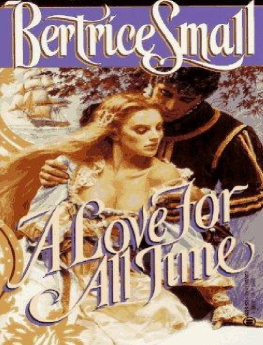
Bertrice Small
To Love Again
1993
BRITAINA.D. 44-406
The Celtic warrior, a Catuvellauni by tribe, lay facedown in the mud upon the smoking earth. His naked body, battered and broken, was painted a vibrant shade of blue. Around him a thousand more of his kind lay dead or dying while Roman legionaries moved methodically over the battlefield administering the coup de grace to those unfortunate enough to still be clinging to life. He could hear the calls of the carrion birds gathering, and a shudder ran through him.
Nearby, a party of Roman officers stood watching. Turning his head slightly, he viewed them through slitted eyelids, recognizing to his amazement the emperor himself. The warrior moved his hand stealthily toward his javelin. Slowly, his fingers closed about its shaft, feeling the comfortable familiarity of the smooth ashwood. He was barely breathing, but it did not matter. Breathing hurt too much now.
With superhuman effort, he pulled himself stiffly to his feet. Then howling like a demon, he hurled his weapon directly at the Roman emperor, exhausting every bit of his remaining strength. To the warrior's deep disappointment, a tall, young tribune standing in the group reacted far more swiftly than he would have thought possible and flung himself in front of the emperor, taking the full brunt of the javelin in his kneecap.
The Catuvellauni warrior had no time to admire the young man's bravery. He was already dead; his head severed from his neck by a second tribune who had leapt forward in his own defense of the emperor. The head, its long hair bloody and matted, rolled across the ground, stopping at the feet of the emperor.
Claudius looked down and sighed deeply. He recognized the head as belonging to one of the personal bodyguards of the Catuvellauni war chief. He had noticed the boy when the Catuvellauni had come to talk peace, even as they were treacherously massing their forces in an attempt to drive the Romans from Britain. The young man had a smallish, but very distinct birthmark upon his left cheekbone. Claudius, physically impaired himself, was quick to notice others with impairments of any kind. He shook his head sadly. He did not like war. So many young lives like this one wasted. Young men fought wars, but it was the old men like himself who planned those wars.
He turned away from the severed head, giving his attention now to the tribune who had shielded him from certain death. "How is he?" the emperor asked the surgeon who was kneeling by the tribune's side, staunching the copious flow of blood.
"He'll live," came the dour reply, "but there will be no more soldiering for this one, Caesar. The javelin, by the grace of the gods, missed the artery to his heart. It has chipped the knee bone, and damaged the tendons. The boy will walk with a marked limp the rest of his days."
Claudius nodded, and then he asked the injured young man, "What is your name, tribune?"
"Flavius Drusus, Caesar."
"Are we related, then?" the emperor wondered aloud, for he was Claudius Drusus Nero.
"Distantly, Caesar."
"Who is your father?"
"Titus Drusus, Caesar, and my brother is also Titus."
"Yes," the emperor said thoughtfully. "Your father is in the senate. He is a just man, as I recall."
"He is, Caesar."
"You are the Tribunus Laticlavius of the Fourteenth," the emperor said, noting the young man's uniform. "You will have to go home now, I fear, Flavius Drusus."
"Yes, Caesar," came the dutiful answer, but Claudius heard more than just disappointment in the young man's voice.
"You do not want to go home?" he asked. "Is there no young sweetheart or wife eagerly awaiting your return, then? How long have you been with the Fourteenth, Flavius Drusus?"
"Almost three years, Caesar. I had hoped to make a career in the army. I am the youngest son of Titus Drusus. There are three older than I am. My eldest brother will follow in our father's footsteps, of course; and Gaius and Lucius are both magistrates. Another magistrate from the Drusus family, and we could easily be accused of a monopoly," Flavius Drusus finished with a small smile. Then he winced, and grew pale as the javelin was drawn from his leg.
Claudius almost groaned in sympathy with the young man's obvious pain. Although the titular second-in-command of his legion, a Tribunus Laticlavius was really an honorary post. There were six tribunes in each legion, and five of them were usually battle-hardened veterans. The Tribunus Laticlavius was always a youngster in his teens from a noble family, sent to spend two or three years with the army to shape him up, or get him out of trouble, or away from bad companions. Usually at the end of his term the Tribunus Laticlavius went home to a magistrate's position, and a rich wife.
The emperor turned to the legionary commander. "Is he a good soldier, Aulus Majesta?"
The legionary commander nodded. "The best, Caesar. He came to us like they all do-green, and wet behind the ears-but unlike the others I've had to put up with in my career, Flavius Drusus has been eager to learn. He was to stay on until one of my other tribunes retired in another year. Then I planned to move him up in the ranks." He looked down at the young man, pale with his injury. "What a pity, Caesar. He's a good officer, but I can't have a tribune with a gimpy leg, now can I." It wasn't a question.
Claudius was tempted to ask Aulus Majesta what a man's gait had to do with his ability to make good military decisions, but he refrained from it. His own limp, and stammering speech, had made him a laughingstock his whole life. He had been considered unfit for anything, even by his own family. But when his dreadful nephew, Caligula, had been murdered and deposed, the army had turned to him to rule Rome. Claudius was more aware than most of the disadvantage Flavius Drusus faced. Prejudice of any kind was difficult to overcome.
"You must be rewarded for saving my life," he said firmly.
"I but did my duty, Caesar!" the young tribune protested.
"And in doing so you have lost your military career," the emperor replied. "What will happen to you when you return home? You have nothing, being a younger son. In saving my life you have, in a sense, lost yours, Flavius Drusus. I would be unworthy of the noble tradition of the Caesars if I allowed such a thing. I offer you one of two choices. Think carefully before choosing. Return to Rome with honor, if you desire. I will give you both a noble wife and a pension for all of your days. Or remain here in Britain. I will give you lands that will be yours and your descendants' forever. I will also settle a sum of money upon you that you may build a home."
Flavius Drusus thought a long moment. If he returned to Rome, noble wife or not, he would be forced to live in his father's house, which would one day be his eldest brother's house. His pension would probably not be enough for him to buy his own home. The noble wife would be some younger daughter with little of her own. How would they dower daughters, or successfully launch their sons' careers? If he remained in Britain, however, he would have his own lands. He would not be beholden to anyone. He would found a new branch of his family, and with hard work become a rich man in his own right.
"I will stay in Britain, Caesar," he said, knowing that he had made the right decision.
***
And that, Titus Drusus Corinium told his children in the summer of a.d. 406, "is how our family came to this land some three hundred and sixty-two years ago. The first Flavius Drusus was still alive when Queen Bodicea revolted against Rome. Though the town of Corinium, where he had settled, was not touched by the revolt, he realized then that perhaps our family would be better served by making alliances with the local Celtic tribes rather than by sending for Roman wives. So his sons married into the Dobunni tribe, and the sons and daughters who came after that have intermarried with both Celts and Roman Britons until this day."
Next page



